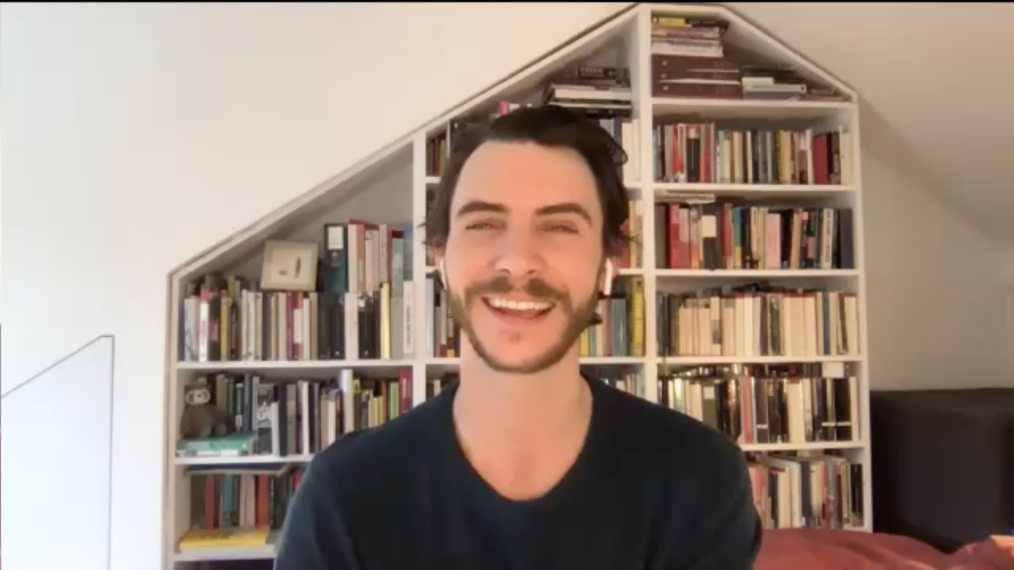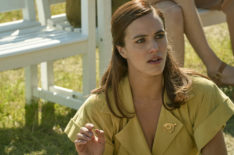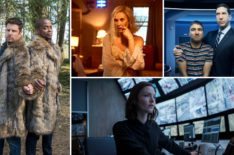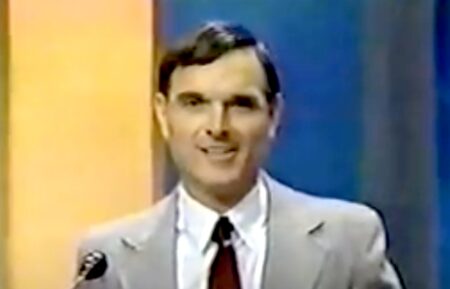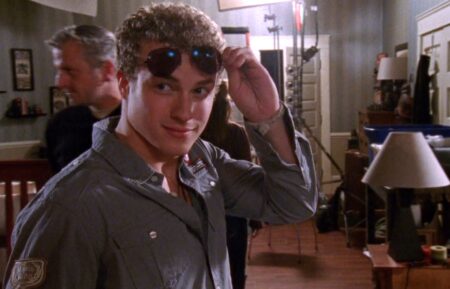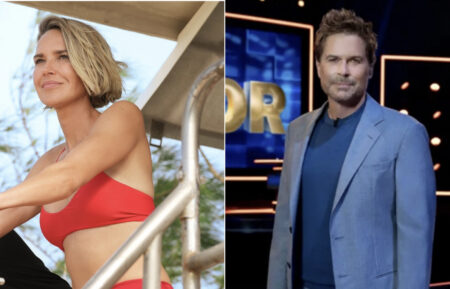‘Brave New World’ Sparks a Rebellion in Violent Season Finale (RECAP)
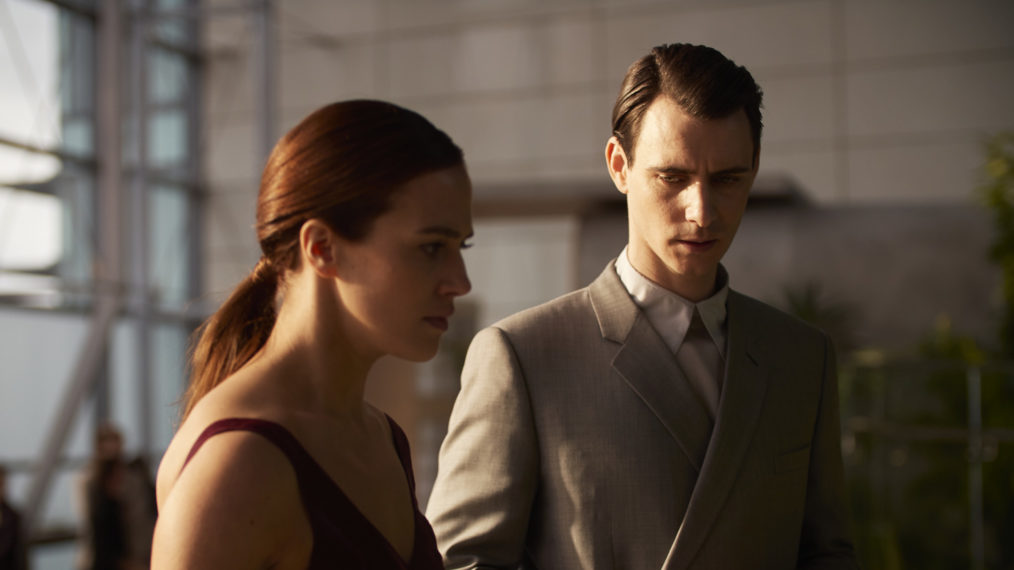
Spoiler Alert
[Spoiler Alert: This recap contains spoilers from Brave New World Season 1 Episode 9, “Soma Red”]
It stands to reason that the moment Bernard (Harry Lloyd) finally becomes Director of Stability that the entire world falls apart. He barely has the chance to breathe in his new office smell and spin on his swanky chair before bloody chaos erupts outside his glass walls. That’s right; Brave New World ends its first (and only?) season in violent rebellion, forgoing a lot of the great character work for big set-pieces and nonsense sci-fi cliffhangers.
I suppose it was inevitable that the show would head in this direction in its final stretch. It had to up the intensity somehow, which meant more typical sci-fi dystopian drama, with the massive fight scenes, end-of-the-world premonitions, and twisty plot developments. I get it, and the scenes of rebellion are handled well, for the most part, even if somewhat unearned. There is real grim brutality in the way the Epsilons casually murder their masters. However, I found that Brave New World was at its best when it was having fun, sticking its tongue out, and focused on the relationships of its central characters. All the surrounding drama with Indra, the killer computer, was never as interesting to me.
The pandemonium kicks off after Henry Foster’s (Sen Mitsuji) brutalized body is discovered. Mustafa Mond (Nina Sosanya) takes the blame as she was the one that let the savage into New London. “We need to stop him before he goes too far,” she tells Bernard, naming him the new Director in the process. But it’s already too late. John (Alden Ehrenreich) is heralded as a hero to the Epsilons, who let him hide-out in their underground living quarters. To CJack60 (Joseph Morgan) and his disgruntled comrades, John is a leader, the man they wish to follow into the future, a future where there is no more hierarchy, “no one above, no one below.” “You spoke, we listened,” CJack60 tells John.
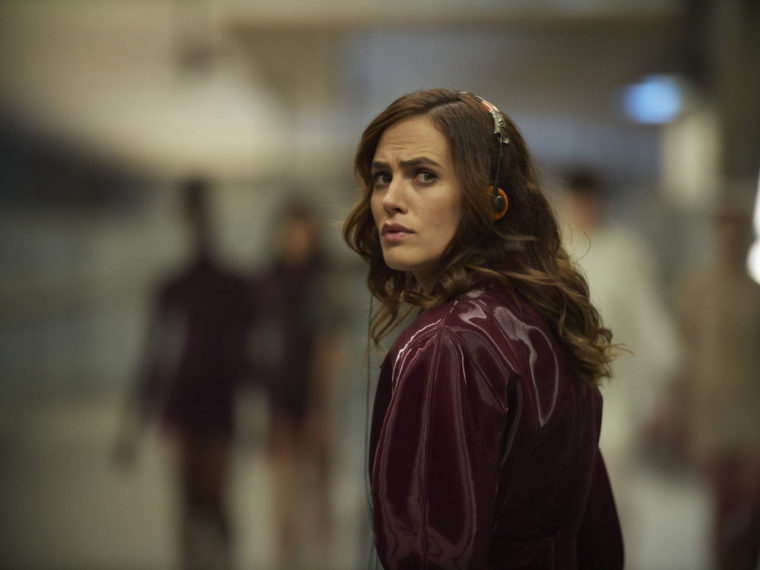
(Steve Schofield/Peacock)
John did not sign up to be a revolutionary leader, however. “Don’t listen to me,” he says. “You already know how it should be. You don’t need me to tell you.” The sulky savage is still hurting over his spat with Lenina (Jessica Brown Findlay) and isn’t exactly in the mood for a political uprising. “Just give up,” he tells them. But when he hears the nervous click of a soma dispenser in the crowd, his feelings suddenly change. In a scene that mirrors one from Huxley’s novel, John tells the Epsilons that they don’t need soma. “They need you to need it because if you stop taking it, you might find out how you feel. You might blame someone. You might blame them,” he states. “Choose! You wanna be happy, or do you wanna be free?”
Before you know it, the Epsilons are throwing away their soma and helping John smash-up the distillery that supplies New London with the addictive drug. For a moment, John is genuinely happy; he laughs with his Epsilon brothers as a rainbow-colored rainstorm gushes from above. But property damage is about as far as John’s protests go. He still doesn’t want to lead a revolution; all he wants is to find Lenina and leave this godforsaken city. “I want payback, but not more than I want her,” he tells CJack60. But—just like with Bernard and Mustafa—the situation has already slipped out of John’s hands. This has become something bigger than him and his feelings, and there’s nothing he can do to stop it.
Above ground, New London is spiraling into anarchy; no more embryos are being produced, and the soma supply has stopped. People fight over the last scraps of soma—junkies fiending for their next fix. Bernard desperately tries to calm the situation, but for Lenina, she’s done, like John, she wants out of New London. She rips out her optic interface and crushes it beneath her high heel. She argues back with the colleagues who blame her for Frannie’s (Kylie Bunbury) reconditioning. And she ignores Bernard’s orders to come to his office. “There’s no reason an Alpha and a Beta can’t be friends,” Bernard tells Lenina, trying to reignite their Savage Lands chemistry and paint John as a ruthless killer. “He was your friend!” Lenina snaps back.
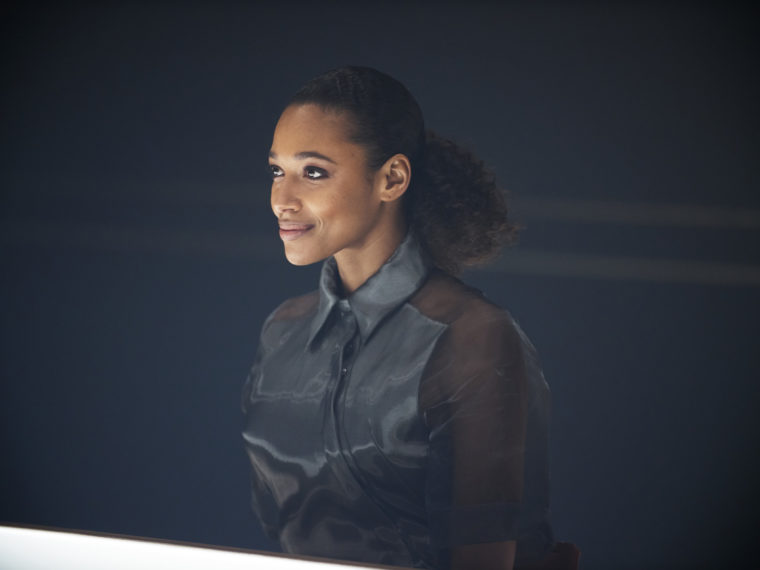
(Steve Schofield/Peacock)
Lenina visits John’s apartment, but he’s not there, just Gary the Gamma (Matthew Aubrey) and a room full of meat pies. “That’s a lot of pies,” Lenina observes. It’s nice to see Gary and his baking skills back, especially as he is one of the only characters providing humor in an otherwise bleak episode. Lenina tells Gary that she’s leaving New London and to pass on a message to John, though she stops herself short, unable to think of the words to say. “She said, ‘If you see John, tell him I…’,” Gary informs John later in the episode. “Tell him I, what?” John inquires. “That’s it.” I think I’d quite happily watch a romantic comedy spin-off with Gary as a sort of inept dating coach for John and Lenina.
In terms of drama, the strongest scene of the episode in that regard is when Bernard confronts John. “This is your fault,” Bernard snipes as the two men stand amongst a corridor of dead bodies. “The Epsilons were perfectly happy before you came here.” John argues that all he did was help people feel things, whether they were good or bad. But Bernard doesn’t buy it. He’s seen John’s memories; he knows John played a part in the rebellion back in the Savage Lands, so why should he think differently now? “We have a responsibility to the social body, and all you do is destroy,” says Bernard. Lenina isn’t as hard on John, but she’s frightened all the same. “Everywhere you go, things fall apart,” she says.
That’s kind of where the character focus ends for the episode. What follows is mostly fighting and chasing and sci-fi silliness. The Epsilons charge the city, mercilessly stabbing men and women with their spikey trash pickers—John’s screams for them to stop fall on deaf ears. Lenina is apprehended by Frannie, who has been reconditioned into a badass latex-wearing assassin—there’s a decent bit where Frannie tries combating her own conditioning. Meanwhile, Helm (Hannah John-Kamen) confronts Mustafa about her past and secret daughter. I’m not quite sure how Helm found out? Something to do with seeing it inside John’s memories? It didn’t make a lot of sense.
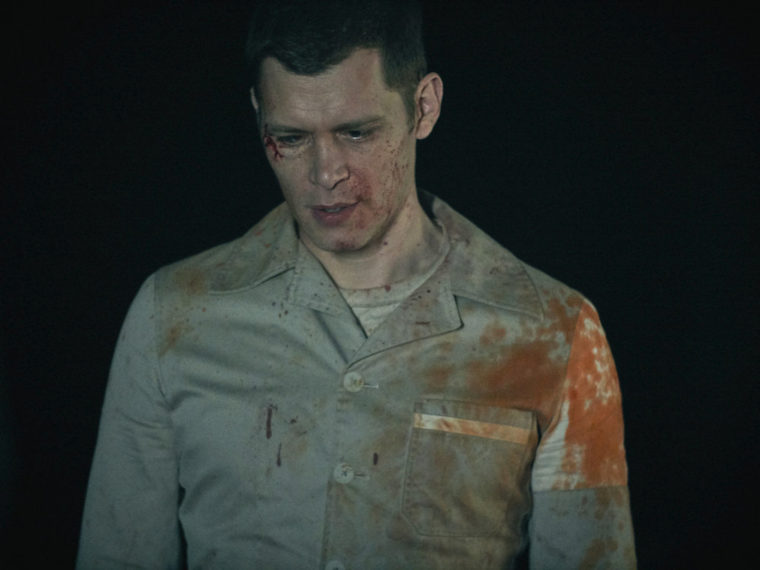
(Steve Schofield/Peacock)
Speaking of not making a lot of sense, the entire side-plot, that became the main plot, with Mustafa and Indra never quite worked for me. I guess there was an attempt to give it an emotional resonance by having Indra take the form of Jane (Sophie McIntosh), Mustafa’s daughter, but it didn’t help their meandering conversations. Here, Mustafa tells Indra that she’ll be lonely after everyone is wiped out. Then she enlists CJack60 to help her shut off the underground Matrix-lab that contains her comatose scientist friends. “None of this is real,” she tells him. “What you see is an illusion.” There’s also some gnarly business where CJack60 slices the optic from his eye with that piece of metal he’d been carrying around all season.
The episode completely loses me after the machine is switched off. The sleek metropolis melts away, and Bernard appears in a sort of red void surrounded by bubbles containing various worlds. “Where am I?” he wonders aloud. “Nowhere,” says Indra, who tells Bernard that she’s taking him because she doesn’t want to be alone. For a moment, I thought it was suggesting that the entire city of New London was an illusion, a computerized paradise painted over the broken rubble of old London. But that isn’t the case because Bernard wakes up on a cliff’s edge, next to a mysterious gold box, with Helm saying she had a vision of him as a leader “in a place where they feel everything.” This sets up their journey to the Savage Lands at the end of the episode.
And New London still very much exists, albeit with a severely decreased population. Mustafa names Lenina the new Director of Stability; I’m not sure why anyone would accept that cursed mantle at this point, but you do you, Lenina. “This isn’t over,” Mustafa tells her. “Indra is still out there, feeling for the first time, lost, hurt, angry. And hurt children often do bad things.” She might as well have been reading out a synopsis pitch for season two, which suggests an Indra-influenced Bernard will raise his own savage rebellion. “You will have no one to guide you, no protection,” Mustafa says of Lenina’s new role. “It’s your choice.” The suggestion here being that New(er) London will be crafted in a freer, more democratic image.
As for John, he’s still kicking around too, seemingly residing in a rustic old townhouse under the city. Or perhaps it’s just a simulation. Who knows? Is this banishment? If so, it doesn’t seem all that bad. He gets to play out his fantasy of living by the lake and fishing for his supper. The only issue is, he’s alone, and I don’t think the virtual date nights with Lenina will be enough to satisfy his longing in the long-run.
All of the resets and cliffhangers and perplexing sci-fi bunkum do very little for me. They felt tacked on in the hopes of a recommission. But you know what, if that’s what it takes to get a second season, I’m okay with it. Because, for all its flaws, I do think there is a solid show within the shiny coating of Brave New World, with the potential to become a great show. When it played into the humor, it showed some excellent comedy chops, and its cast, Lloyd and Findlay, in particular, rose to the occasion. Yes, not everything worked. It often juggled too many themes without ever scratching below the surface. Some slick commentary on over-medication and trend-chasing aside, it missed the mark on using its setting to delve deeper into the current class disparity or political rhetoric.
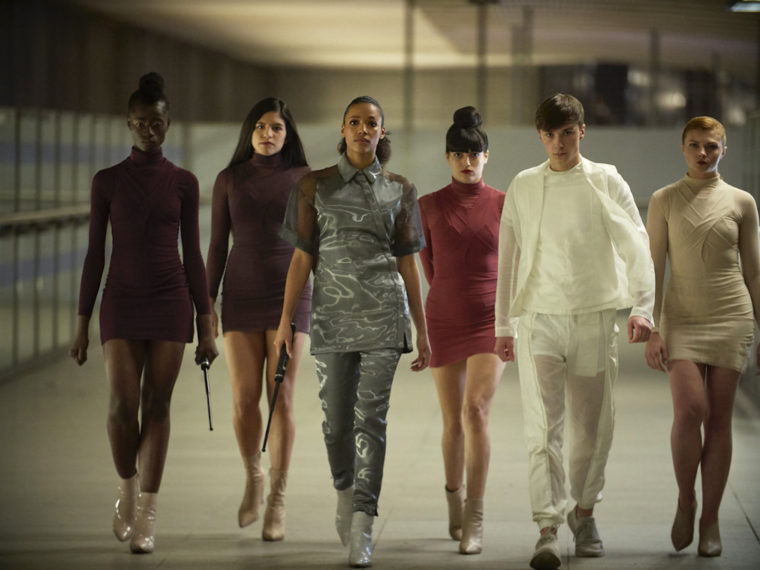
(Steve Schofield/Peacock)
However, where Brave New World succeeds, and other sci-fi shows fail, is its focus on the function of people over robots and computers. The topics of intimacy and monogamy and possessiveness are all given a human touch. But, specifically, the show highlighted this idea of loneliness in a world where everyone is connected. It’s strangely fitting as we sit in various stages of quarantine around the world, keeping in touch with friends and family via social media and Zoom calls. Like John in banishment, the power to connect virtually is great, but it doesn’t equate to the real thing, to actual human contact. The ability to communicate with people is more accessible than ever, but to emotionally connect is a whole other thing, and Brave New World nailed that beautifully.
Brave New World, Now Streaming, Peacock

